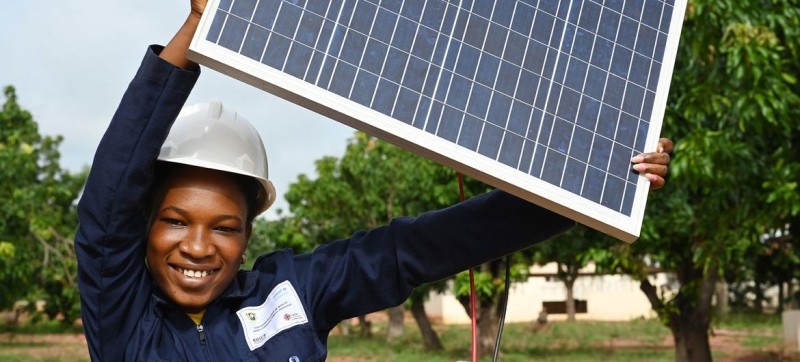
© UNICEF/Frank Dejongh A teenage woman in Côte d'Ivoire holds up a solar panel which she is studying as part of a renewable energy course.
The unanimous declaration of the Decade of Sustainable Energy for All in 2012 aimed to hone on the importance of improving “access to reliable, affordable, economically viable, socially acceptable and environmentally sound energy services and resources for sustainable development.”
Dennis Francis said there have been both achievements and shortcomings in meeting the goal throughout the decade.
He noted that developing countries experienced a 9.6 per cent annual growth in renewable energy installation and the global population with access to electricity has increased from 87 per cent to 91 per cent since 2015.
Yet, he said, “the pace of energy transformations is still much too slow – and the benefits are not shared equitably.”
‘Business as usual cannot be a credible option’
Mr. Francis said urgent action needs to be taken to address these sustainability issues, especially since more than 73 million people in least-developed countries continue to remain without electricity.
“We must truly deliver to all people, universal access to affordable, reliable, sustainable, and modern energy, while substantially increasing the share of renewable energy in the global energy mix by 2030,” he said.
He also stressed actively trying to make renewable energy three times more widespread worldwide and doubling how much energy we save each year.
Most important, he said, is rectifying, “…the stark moral failure evident in the fact that billions still live without adequate energy, or any energy at all, while others are reportedly planning lunar vacations being offered commercially.”
Meeting the goal
Mr. Francis suggested three ways of meeting their goals – money, making use of resources, and international cooperation.
He said trillions of dollars are needed to accelerate the energy transitions and avoid the impacts of climate change. Next, he said, governments, the private sectors, civil society and more need to work together to source innovations and propel action. And finally, international cooperation “must continue to be the standard bearer for our efforts.”
Sustainability Week discussions
During the week, ministers and dignitaries spent time reflecting on the role of energy in tourism, transport and infrastructure.
As the week went by, the Assembly President called for equal access to sustainable transportation, especially in vulnerable communities; a global tourism sector with “deep local value chains that expand demand for locally made products and services,” and for “quality, reliable, sustainable and resilient infrastructure,” that will make populations safer against natural hazards and sustain trade and commerce, among other things.
Decade of Sustainable Energy
Though the Decade of Sustainable Energy draws to a close this year, the Assembly President is encouraging member states, private sectors and other stakeholders to “further advance international cooperation” to recommit delivering on goals.
“If we are to accomplish our goals and targets by 2030, we must make every effort to sustain this political momentum after the Decade officially concludes,” he said.

